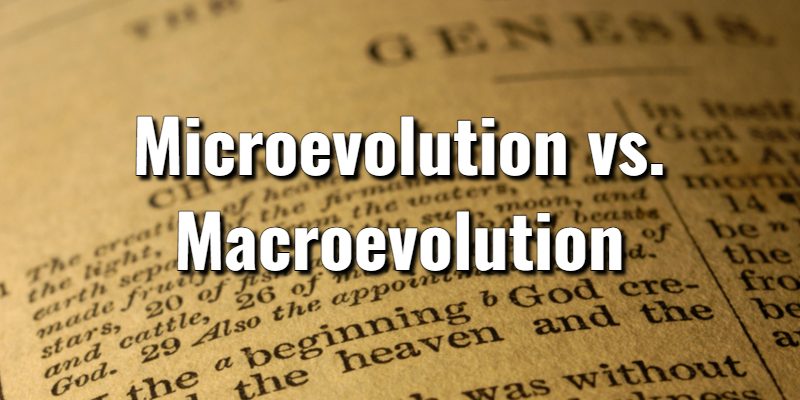For decades, U.S. schools have taught evolution as the answer to the question of origins—but not without pushback. From the Scopes trial in the 1920s to the controversy over teaching Intelligent Design in the 2000s, one thing is for sure: the question of origins provokes debate. Materialists/atheists hold to the Darwinian evolutionary theory while creationists say that the history of life manifests the work of an intelligent Designer. What should Christians know about these two views?
Microevolution vs. Macroevolution
The term “evolution” doesn’t have one simple meaning. Even so, there are some accepted understandings:
Creationists accept microevolution, a process of small changes within a species over a relatively short period of time (within one lifetime or a few generations). Microevolution can be reconciled with the Biblical creation account since it posits logical changes within kinds. Changes occur because intraspecies traits adjust, thrive, and perpetuate.
For example, large-bodied sparrows might thrive in cooler climates and perpetuate that large-bodied trait. Smaller-bodied sparrows might migrate and flourish in warmer climates.
While microevolution is reconcilable with the Biblical account of creation, macroevolution is not. See Genesis 1:24-25: “And God said, Let the earth bring forth the living creature after his kind, cattle, and creeping thing, and beast of the earth after his kind: and it was so. And God made the beast of the earth after his kind, and cattle after their kind, and every thing that creepeth upon the earth after his kind:”
Our modern concept of macroevolution comes primarily from Charles Darwin’s 1859 publication “On the Origin of the Species by Means of Natural Selection.” Darwin posited that all beings come from a common descent. This is pictured as Darwin’s famous “tree of life.” Darwin theorized that over very long periods of time, species evolved from one kind to another kind through an unguided process of natural selection.
In the Genesis account, the process is guided by God, and each “kind” is distinct—not evolved from other “kinds.” Materialists accept macroevolution and see microevolution as merely a step within the macroevolution process.
Theistic Evolution
Not all creationists object to macroevolutionary theory. Theistic evolution is an attempt to square Darwinian evolutionary theory with belief in God. Although there are differing definitions of theistic evolution, one basic understanding is that God created through the evolutionary process.
However, creationist critics of theistic evolution claim that Darwinian evolutionary theory and the Biblical creation account cannot be reconciled. They note that Darwinian evolution posits an unguided process that makes it antithetical to creationism. They question where God is in the theistic evolutionist’s act of creation.
Intelligent Design
Intelligent Design (ID) challenges Darwinian evolutionary theory with a common-sense premise: Evidence of purposeful arrangement implies a Designer. The heap of parts doesn’t arrange itself into a fully functioning machine, regardless of how long those parts exist.
Dr. Stephen Meyer, a former geophysicist who earned his Ph.D. in philosophy of science from Cambridge, is one of the key proponents of the Intelligent Design theory.
Microevolution vs. Macroevolution: Key Resources to Consider
Lord’s Library has compiled these resources to help you sort through the debate between microevolution vs. macroevolution:
Discovery Institute at discovery.org
The Discovery Institute presents information and resources on Intelligent Design. The “About Us” section indicates that the Institute “investigates the life-changing possibilities of a universe brimming with information and intelligent design.” The site contains articles, educational resources, ID event information, and more.
“The Meanings of Evolution” by Stephen C. Meyer and Michael Keas
Engaging in a meaningful debate starts with understanding the terms used in that debate. People often have different notions of the word “evolution.” In this article, Drs. Meyer and Keas thoroughly explain the definitions of that word.
Darwin’s Doubt by Stephen C. Meyer
If you’re interested in further exploring the problems with Darwinian evolutionary theory, this book by Dr. Meyer might interest you. Here, Dr. Meyer discusses the concern Darwin had about his own evolutionary hypothesis, specifically in light of the geological period called the Cambrian explosion.
Question of the Week #253: Evolutionary Theory and Theism
In Dr. William Lane Craig’s Question of the Week series, he tackles readers’ apologetics questions. In this question, a reader asks Dr. Craig about Dr. Meyers’ concerns regarding theistic evolution.
Article Index for “Evolution vs. Creationism” on GotQuestions.org
The Got Questions team makes nearly any apologetics topic easily understandable, including evolution. They have answered several questions concerning evolution, including:
- What are some flaws in the theory of evolution?
- What does the Bible say about creation vs. evolution?
- What is theistic evolution?
“Does the Cambrian Explosion Disprove Darwinism?” by Ryan Leasure on Crossexamined.org
In the history of life, the geological discovery referred to as the Cambrian explosion revealed fully formed animal fossils that had no transitional fossil records. These findings were known when Darwin published his On the Origin of the Species, and they concerned him. Darwin knew that those missing transitional links in the fossil record cast doubt on his evolutionary theory, but he assumed that future findings would vindicate him (that didn’t occur). This article by Ryan Leasure, a pastor/elder of Grace Bible Church in Moore, S.C., highlights this key weakness in Darwinian evolutionary theory.
Human dignity and worth stems from our being made in the Imago Dei, or the image of God. Life loses meaning without that. Genesis 1:27 says, “So God created man in his own image, in the image of God created he him; male and female created he them.”
Our origin story matters.
Lord's Library participates in affiliate programs. We may make a small commission from products purchased through this resource.
- Intelligent Design vs. Evolution: Six Web Resources to Consider - October 3, 2023
- Microevolution vs. Macroevolution: Six Web Resources to Consider - September 9, 2023
- Atheist Objection to Theism #4: Presumption of Atheism Argument - August 21, 2023













